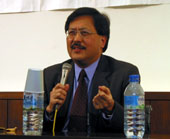
Reynaldo C. Ileto, National University of Singapore

I have said enough. But I think on the question of what we are supposed to be doing after this, we are supposed to be producing a book, and I noticed that there are basically two kinds of papers: one type of paper is kind of reflexive and sort of looking at how we have done history in the past and how we might continue to do what we are doing or do something else. Then another kind of paper has to do with actually writing some account which probably reflects our view of how history should be written. I do not know whether we should try to write papers which are along the same vein, or allow for different types of papers, but I think it is well worth reminding ourselves that actually almost all of the issues that we brought up in this workshop could have been the subjects of workshops on their own. I can imagine cutting-edge workshops being sponsored by NUS or ANU on some of the specific topics we talked about, like manipulation of memory or the limits of historical understanding, and that sort of thing.
I then wonder what our group can contribute that is unique, that reflects the particular make-up of this group, and the environment in which we have been brought together and the people who organized it, who I am sure probably have their own hopes about what we ought to be producing out of all this. So, instead of providing an answer, I think we might invite everyone to e-mail each other or the organizers about what we think would be the best way of producing a book that is unique because I am just wondering whether we can just put together our papers and that is it. Well, it would probably satisfy the funding agencies but it might not be a satisfying volume in the end if, for example, some people might think, gOh, but I can think of a book published by Oxford that actually deals with that particular issue in a much more organized and deeper manner.h I would not want that to happen. Well, my own bias is toward a more reflexive paper that reflects our own practices as historians. I will leave it at that.
I must say I have had a great time in the last two days and it is a fitting climax of the project.
Well, I think on behalf of everyone in this group, we would like to thank
Chiharu especially for being such a great helmswoman and for looking into all
the possible problems that might arise, so that actually none have arisen and
we have all managed to do what we were supposed to do, I guess, most of us.
So we are here, able to end it in a way that is satisfying enough to most of
us, all of us.